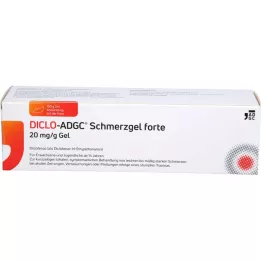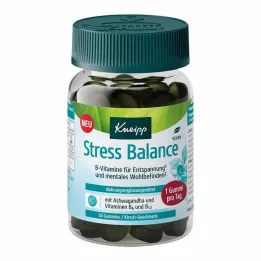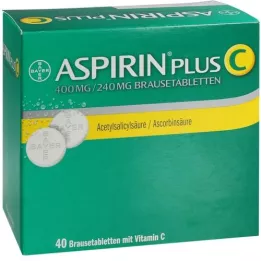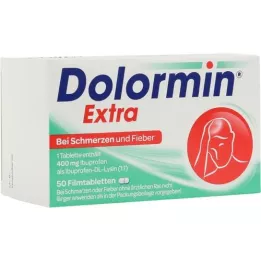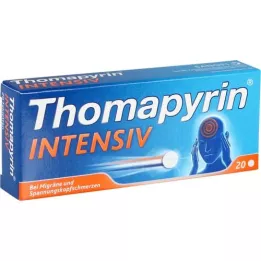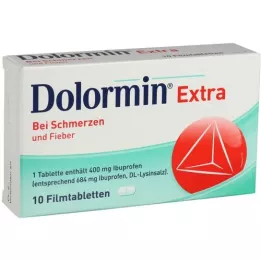MELABON K Tablets, 20 pcs
MELABON K Tabletten
Manufacturers: MEDICE Arzneimittel Pütter GmbH&Co.KG
PZN: 04566980
Dosage: Tabletten
Content: 20 St
Reward Points: 41
Availability: In stock
$9.89
$7.64
from German pharmacies to your address
Instructions for use for MELABON K Tablets, 20 pcs
Melabon ® K
Melabon K is used for light to moderately severe pain.
Warning: In the event of pain or fever without medical advice, no longer apply than specified in the package insert!
Read the package supplement and ask your doctor or pharmacist for risks and side effects.
Detailed instructions for MELABON K Tablets, 20 pcs
Field of use
- The drug A pain relieving, fever -lowering and anti -inflammatory medicine (non -steroidal anti -phlogistics/analgesic - a combination of acetylsalicylic acid, paracetamol and caffeine).
- It is used for slight to moderately severe pain.
- Please note the information for children and young people.
- If you don't feel better or worse after 4 days, contact your doctor.
Active ingredients / ingredients / ingredients
250 mg acetylsalicylic acid
50 mg caffeine
250 mg paracetamol
Cellulose, microcrystalline auxiliary material (+)
Hypromellic auxiliary substance (+)
Corn starch auxiliary substance (+)
Methylcellulose auxiliary substance (+)
Polydimethylsiloxan Hedge substance (+)
Silicium dioxide, high disperser auxiliary substance (+)
Talcum auxiliary material (+)
Sorbic acid auxiliary material (+)
Contradictions
- The medicine must not be taken
- if you are allergic to acetylsalicylic acid, paracetamol, caffeine or one of the other components of this drug;
- if in the past you have reacted to salicylates or other non-steroidal inflammatory inhibitors (certain remedies for pain, fever or inflammation / nsars) with asthma attacks or in other ways;
- in the case of gastrointestinal bleeding or breakthrough (perforation) in the history, in connection with previous therapy with non-steroidal anti-rheumatics / anti-inflammatory drugs (NSAars);
- in the event of existing or repeated stomach and duodenum ulcers (peptic ulcers) or bleeding with at least two episodes of demonstrated ulcers or bleeding;
- with pathologically increased bleeding tendency;
- for liver and kidney failure;
- with severe heart muscle weakness (severe heart failure);
- if you take 15 mg or more methotrexate per week at the same time;
- in the last three months of pregnancy;
- of children under the age of 12.
- Acetylsalicylic acid, one of the active ingredients of the drug, belongs to a group of medicines (non-steroidal anti-inflammatory drugs) that can affect the fertility of women. This effect is reversible after stopping the drug (reversible).
dosage
- Always take this medicine exactly as described or exactly after the agreement made with your doctor or pharmacist. Ask your doctor or pharmacist if you are not sure.
- The recommended dose is:
- Adults and children from the age of 12 take 1 to 2 tablets (corresponding to 250 to 500 mg acetylsalicylic acid, 250 to 500 mg paracetamol and 50 to 100 mg caffeine). The total daily dose of up to 6 tablets (corresponding to 1500 mg acetylsalicylic acid, 1500 mg paracetamol and 300 mg caffeine) must not be exceeded.
- If necessary, the single dose can be taken up to 3 times a day at intervals of 4 to 8 hours.
- Special patient groups
- Liver dysfunction and easy restriction of kidney function
- In patients with liver or kidney dysfunction and Gilbert syndrome, the dose must be reduced or the distance between the individual doses must be extended.
- A daily overall dose of 2 g paracetamol must not be exceeded without medical instruction.
- Heavy renal insufficiency
- In the case of severe renal insufficiency (creatinine clearance < 10 ml/min), the distance between the individual doses must be at least 8 hours.
- Adult:
- glomerular filtration rate dose: 10 - 50 ml/min
- Dose: 500 mg paracetamol every 6 hours
- glomerular filtration rate: <10ml/min
- Dose: 500 mg paracetamol every 8 hours
- glomerular filtration rate dose: 10 - 50 ml/min
- Older patients
- Experience has shown that no special dose adjustment is required.
- However, a reduction in the dose or extension of the dosage interval may be necessary for weakened, immobilized older patients with restricted liver or kidney function.
- Without medical instructions, the maximum daily dose of 60 mg paracetamol/kg body weight (up to a maximum of 2 g/day) should not be exceeded at:
- Body weight below 50 kg
- Chronic alcoholism
- Water deprivation
- chronic malnutrition
- Children and adolescents with low body weight
- Use in children under the age of 12 or below 43 kg body weight is not recommended because the dose strength is not suitable for this age group.
- Liver dysfunction and easy restriction of kidney function
- Duration of the application
- Do not take the medicine without a medical or dental advice for more than 3 days.
- If you have taken a larger amount than you should
- In order to prevent the risk of overdose, it should be ensured that other medicines that are taken at the same time do not contain any paracetamol.
- The total dose of paracetamol should not exceed 4 g (corresponding to 4000 mg paracetamol) for adults.
- In the event of an overdose, there are generally complaints within 24 hours that include nausea, vomiting, loss of appetite, pallions and abdominal pain. Dizziness and ear blades can also be a serious poisoning, especially in children and older patients. Other characters can be heart problems and an accelerated pulse.
- If there is a suspicion that a larger amount has been taken than recommended, call the next Austrian doctor to help!
- According to the severity of overdose / poisoning, this can decide on the measures necessary.
- If you have forgotten the intake
- Do not take the double amount if you have forgotten the prior intake.
- If you have any further questions about taking this medicine, please contact your doctor or pharmacist.
Taking
- Please take the tablets with plenty of liquid (e.g. a glass of water).
- Do not take on an empty stomach.
Patient information
- Warnings and Precautions
- Please speak to your doctor or pharmacist before taking the preparation.
- A particularly careful medical monitoring is required:
- in case of hypersensitivity to other inflammatory inhibitors / anti -rheumatics (certain remedies for rheumatism or inflammation) or other allergy trigger substances;
- if allergies exist (e.g. with skin reactions, itching, nettle fever) or asthma, hay fever, nasal mucosal swelling (nasal polyps), chronic respiratory diseases;
- with limited liver and kidney function;
- in the case of high blood pressure and weakness in the heart (heart failure);
- before operations (even with smaller interventions, such as the pulling of a tooth); There can be an increased tendency to bleed. Please inform your doctor or dentist if you have taken this medicine.
- with limited liver function (liver inflammation, Gilbert syndrome);
- in chronic alcohol disease;
- in the case of thyroid overactive;
- for cardiac arrhythmias;
- for anxiety disorders.
- if medication is taken at the same time that affect liver function;
- in the event of an inherited lack of the enzyme glucose-6-phosphate dehydrogenase, which is too severe Bcan lead lucMutism, also called favism;
- in hemolytic anemia (anemia due to a decay of the red blood cells);
- in the event of a deficiency of the protein glutathione involved in the liver metabolism (e.g. in the event of malnutrition, alcohol abuse);
- in the event of a lack of liquid in the body (dehydration) z. B. due to small amount of drinking, diarrhea or vomiting;
- in chronic malnutrition;
- with a body weight of less than 50 kg;
- with higher age.
- In order to prevent the risk of overdose, it should be ensured that other medicines that are used at the same time do not contain paracetamol.
- If painkillers do not dose for a long time, headaches can occur, which may not be treated by increased doses of the drug.
- When stopping abruptly, headaches and fatigue, muscle pain, nervousness and vegetative symptoms can occur after a long -dosed, non -determined use of painkillers. The deduction symptoms subside within a few days. Until then, painkillers are to be reinforced and the revenue should not take place without medical advice.
- Do not apply the preparation for a long time or in higher doses without medical or dental advice.
- Taking the total daily dose once can lead to severe liver damage;
- in such a case, medical help should be consulted immediately.
- Effects on the gastrointestinal tract
- A simultaneous use of acetylsalicylic acid with other non-steroidal inflammatory inhibitors, including so-called COX-2 inhibitors (cyclooxygenase-2 inhibitors), which, among. be used against rheumatic symptoms must be avoided.
- In older patients, side effects occur more after using non-steroidal inflammatory inhibitors, in particular bleeding in the stomach and intestinal area that can be life-threatening.
- Bleeding, ulceration and breakdowns (perforations) in the gastrointestinal area that can lead to death was reported in connection with the intake of all non-steroidal inflammatory inhibitors.
- They occurred with or without prior warning symptoms or serious events in the gastrointestinal tract in the prehistory at any time of therapy.
- The risk of this is increased with increasing NSAR dose in patients with ulcers in the history, especially with the complications bleeding or breakthrough, and in older patients. These patients should begin treatment with the lowest available dose.
- Combination therapy with gastric mucosal-protecting medicines (e.g. misoprostol or proton pump inhibitor) should be considered here.
- This is also recommended for patients who take other medicines who increase the risk of a disease of the gastrointestinal tract.
- Patients, especially at older age who have a history of side effects on the gastrointestinal tract, should report any unusual symptom in the abdomen, especially at the beginning of therapy.
- Caution is required in patients who also take medicinal products that increase the risk of ulcers or bleeding, e.g. B. corticoids, anti-blood clotting medication, such as warfarin, and selective serotonin reuptake inhibitors, which, among other things. be prescribed for the treatment of depressed moods or thrombocyte aggregation inhibitors
- Treatment must be canceled when bleeding or ulcer formation occurs in the gastrointestinal tract.
- Other information
- Side effects can be reduced by using the lowest effective dose via the shortest of the period required for symptom control.
- The habitual intake of painkillers can lead to permanent kidney damage with the risk of kidney failure (analgesic nephropathy). This risk is particularly great if you take several different painkillers combined.
- Acetylsalicylic acid reduces uric acid excretion in low doses. This may trigger a gout attack in patients who are prone to reduced uric acid excretion.
- Children and youthhey
- In children over the age of 12, the medicine should only be used on medical instructions with feverish illnesses and only if other measures do not work. If these diseases occur with long vomiting, this can be a sign of Reye syndrome, a very rare but life-threatening illness that is absolutely necessary for immediate medical treatment.
- Effects of taking the drug on laboratory tests
- The urinary acid determination and blood sugar determination can be influenced.
- Wateriness and ability to operate machines
- There are no special precautions required.
Pregnancy
- If you are pregnant or breastfeed, or if you suspect that you are pregnant or intend to become pregnant, ask your doctor or pharmacist for advice before taking this drug.
-
pregnancy
- In the first and second thirds of pregnancy you can only take the medicine after consulting your doctor. In the last three months of pregnancy, you must not take the medicine because of an increased risk of complications for mother and child.
-
Breastfeeding
- The active ingredients acetylsalicylic acid, paracetamol and caffeine pass into breast milk. In the event of short -term use or low doses, an interruption of breastfeeding will generally not be necessary. The condition and behavior of the infant can be affected by caffeine recorded with breast milk.
- If you use or take higher doses for a long time, you should stop.
-
Reproductive ability
- Acetylsalicylic acid, one of the active ingredients of the drug, belongs to a group of medicines (non-steroidal anti-inflammatory drugs) that can affect the fertility of women. This effect is reversible after stopping the drug (reversible).
Hints
Miscellaneous
- Due to the proportion of acetylsalicylic acid, the drug in children over 12 years and young people with feverish illnesses due to the possible occurrence of the so-called Reye syndrome should only be applied and only applied if other measures do not work.
- The daily maximum dose for adults and adolescents over 12 years is 3 times 2 tablets (corresponding to 1500 mg acetylsalicylic acid, 1500 mg paracetamol and 300 mg caffeine).
- A doctor should be notified immediately when black -colored stool occurs.
- In individual cases, a deterioration of infection -related inflammation (e.g. development of necrotizing fascititis) has been described in individual cases. This may be related to the mechanism of action of pain relievers without cortisone.
- If signs of an infection appear or worsen during the use of acetylsalicylic acid, it is therefore recommended to see a doctor immediately.
Therapy monitoring/control measures:
- If the recommended dosage is exceeded, the liver values (transaminases) can increase. Therefore, regular control of the transaminases, especially in children, is required.
- In the case of gastric and intestinal ulcers with restricted liver and kidney function or low-heart weakness, particularly careful monitoring of the treatment is required.
- In the case of high-dose long-term therapy, regular controls of the red blood pigment (hemoglobin value) are to be carried out.
- The habitual intake of painkillers ist dangerous. It can lead to permanent damage to health.
- In general, the long-term taking of painkillers, especially when combining several pain relieving active ingredients, can lead to permanent kidney damage with the risk of kidney failure (analgesic nephropathy).
- The long-term use of the fixed combination can lead to a greater risk of illness with the risk of kidney damage with the risk of kidney failure (analgesics-nephropathy).
- In the case of longer high -dose, non -determined use of pain relievers, headaches and fatigue, muscle pain, nervousness can occur. This deductible symptoms subside within a few days. Until then, painkillers will be reinforced and re -taking it again should take place without medical advice.
Medicines Reviews
Write a review
Related Products
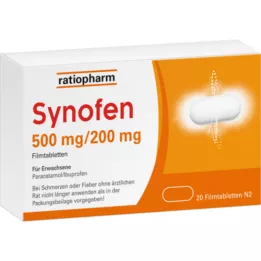
SYNOFEN 500 mg/200 mg film -coated tablets, 20 pcs
SYNOFEN 500 mg/200 mg Filmtabletten
$5.96 $13.26
Popular in Headache
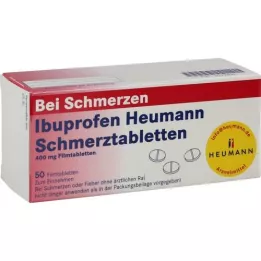
IBUPROFEN Heumann painkillers 400 mg, 50 pcs
IBUPROFEN Heumann Schmerztabletten 400 mg
$7.15 $14.29
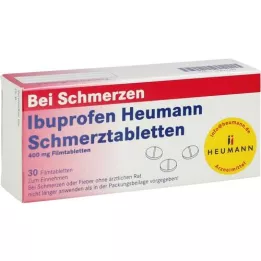
IBUPROFEN Heumann painkillers 400 mg, 30 pcs
IBUPROFEN Heumann Schmerztabletten 400 mg
$5.65 $8.79
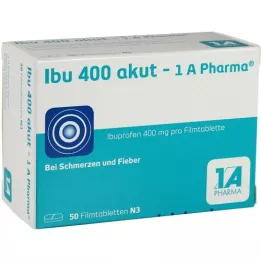
IBU 400 Akut-1a Pharma film-coated tablets, 50 pcs
IBU 400 akut-1A Pharma Filmtabletten
$5.54 $12.34
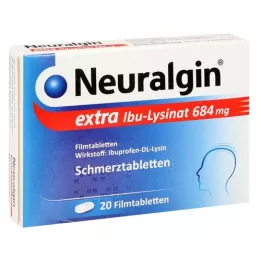
NEURALGIN Extra IBU-Lysinate film-coated tablets, 20 pcs
NEURALGIN extra Ibu-Lysinat Filmtabletten
$8.47 $13.26






